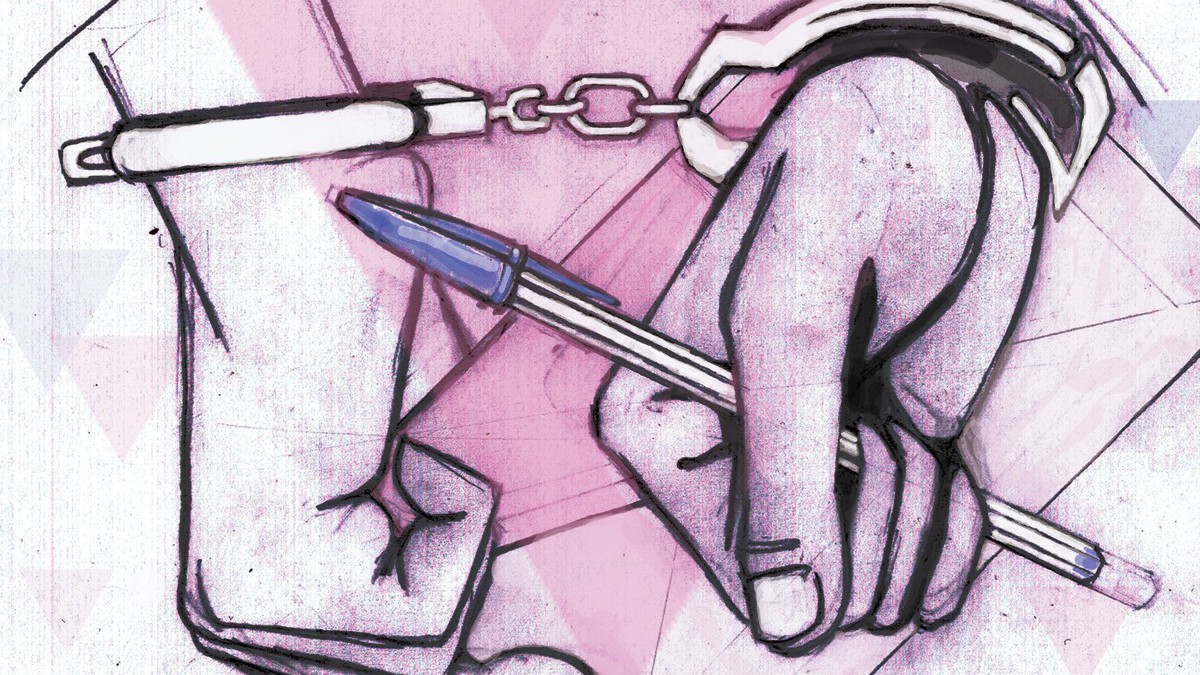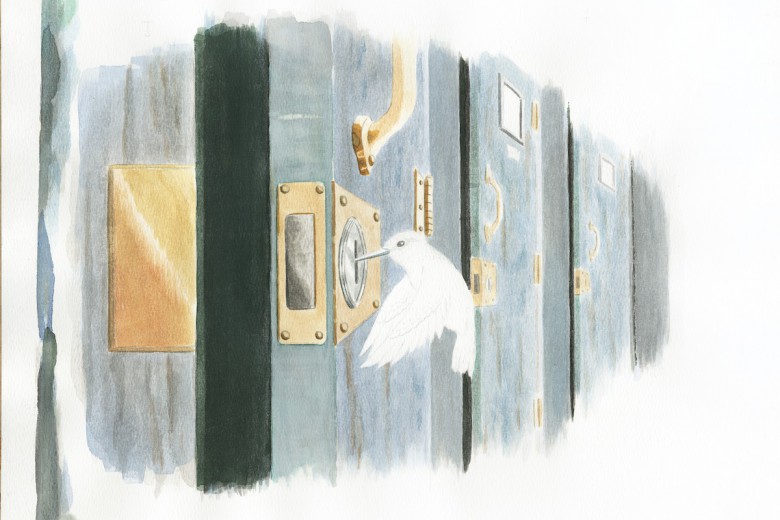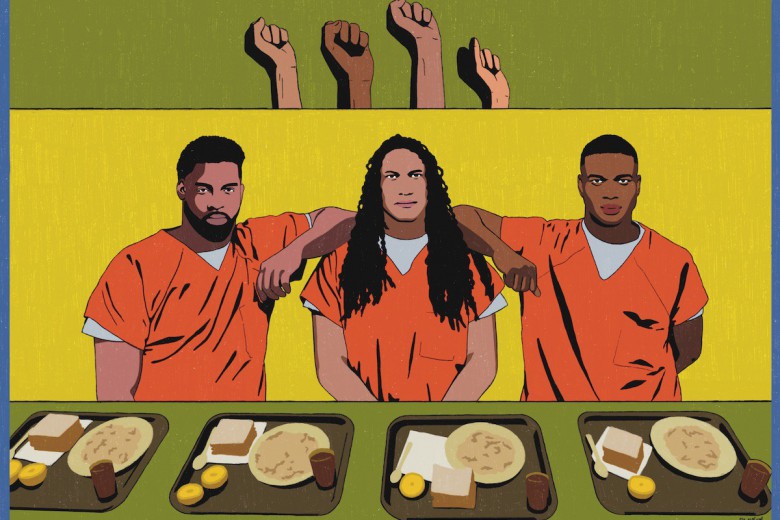For someone stripped of most of their rights, a letter can make all the difference.
Members of the Prisoner Correspondence Project (PCP) know this well. The Montreal-based initiative runs a pen pal program with incarcerated LGBTQ2S folks. Launched in 2007, the project now reaches nearly 3,000 people in more than 500 federal, provincial, and state prisons across Canada and the United States. Similar letter-exchange programs are active in the U.S., U.K., and New Zealand, but the PCP is the only one of its kind in Canada. The project began when Liam Michaud returned to Montreal with a stack of letters from an American letter-writing organization overwhelmed with demand. He started distributing them to friends and the project grew from there, with membership doubling every year since. Now, PCP members on the outside mail about 5,000 letters a year; so many prisoners want to get involved that on average, an incarcerated person waits three to four years to be matched with a pen pal.
“For queer and trans prisoners who aren’t necessarily in contact with their blood families and who maybe don’t have a community of support, to get letters can be life changing and life saving,” says collective member Olivia Dumas. “The whole point of prisons is to isolate people and put them away and forget about them. So it’s a huge act of resistance to be writing to people, because you’re breaking through that wall and showing that you believe this person is worthy of not being isolated.”
Anyone can get involved in the PCP, but most members are queer and trans, building solidarity among prison and LGBTQ2S liberation struggles. The project inverts the typical power dynamics that define prisons, demonstrating that there are real relationships of care and empathy between prisoners and their pen pals on the outside.
The PCP aligns with the prison abolition movement, problematizing the notion that prisons keep societies safe and lessening communities’ dependence on incarceration. It challenges hegemonic notions of criminality and recognizes crime as a result of broader social injustices. Rather than a support group, the PCP views itself as a means of creating mutually sustaining relationships between people confronting the prison system on the outside and the inside.
The PCP’s core collective consists of around 10 non-incarcerated volunteer organizers and an advisory committee of around eight incarcerated members. This structure comes with obstacles; on occasion, incarcerated members are transferred to new institutions without notice and the group can lose touch with them for months. Another barrier is the cost of postage. Since the project does not accept government funding, it largely relies on fundraising and runs on a shoestring budget.
LGBTQ2S bodies continue to be sanctioned and disproportionately incarcerated. Canadian laws unduly targeting queer and trans persons – including the ongoing criminalization of sex work and HIV non-disclosure – are symptomatic of this.
For the collective, letter writing represents a site of resistance to the historical illegality and policing of queerness and gender expression, which has led to the mass criminalization of queer and trans bodies. In Canada, homosexuality was decriminalized in 1969, with the last person explicitly imprisoned for being queer in 1966. Despite legal reforms, however, LGBTQ2S bodies continue to be sanctioned and disproportionately incarcerated. Carceral violence has deep ties to hetero-patriarchy, settler colonialism, white supremacy, and class exploitation, resulting in the increased policing of those who face higher rates of marginalization and violence, and who struggle for survival. Canadian laws unduly targeting queer and trans persons – including the ongoing criminalization of sex work and HIV non-disclosure – are symptomatic of this.
These dynamics are reproduced inside prisons, where queer and trans people face higher risks of surveillance, censorship, harassment, violence, medical neglect, and isolation. Trans people face even further violence and erasure. Dumas notes that one trans woman participant has been consistently misgendered, denied access to gender-affirming clothing, harassed by guards, had personal items stolen, and had her requests to be transferred to a safer institution ignored.
In 2016, the Office of the Correctional Investigator called on Correctional Service Canada (CSC) to update its outdated policy concerning the housing of trans inmates based on their sex assigned at birth. CSC revised its gender policy in January 2017, but continued to place pre-operative trans inmates in facilities that correspond with the inmate’s sex assigned at birth, not their gender. An activist pressed Trudeau on the issue at a town hall later that month, finally sparking a policy reversal. Finally, in late January 2018, CSC announced that it would house inmates based on how they self-identify. Still, CSC policies don’t apply to provincial prisons, so the treatment of trans inmates across provinces can vary. Dumas argues that these changes also mean little if prisoners are not aware of their rights, and changes aren’t strictly implemented. Though these changes may make prisoners’ lives safer, as queer/trans prison abolition scholar Sarah Lamble argues in a chapter written for Captive Genders: Trans Embodiment and the Prison Industrial Complex, carceral gender reforms falsely imply that “discrimination is a ‘flaw’ in the system, rather than intrinsic to the system itself.”
To help inform and sustain LGBTQ2S inmates in such a system, the PCP also sends resources with letters: zines about navigating sexual and racial identity in prison, documents about safer sex and healthy relationships, guides to living with HIV, and queer erotica. Some documents never make it through to inmates; they are often intercepted by prison officials, who confiscate materials. Regulations around letters vary from prison to prison, including restrictions on photocopies, sexual content, and number of pages. Although CSC claims it will only read mail if there are reasonable grounds to believe it will jeopardize the security of the penitentiary or the safety of an individual, Dumas notes that often letters make it through – or not – at the discretion of the official who reads them. The PCP is creative and diligent at working through these obstacles, whether that’s changing the type of envelopes they use, or, in some cases, instigating appeals on rejected mail – sometimes to no avail. But Dumas says outgoing mail is scanned much less frequently, providing inmates with rare opportunities for self-expression.
In the space afforded by letters, the Prisoner Correspondence Project challenges the injustices and mechanisms of the prison system. The collective writes while envisioning a world without incarceration, knowing that when members of our communities are imprisoned, we are all bound.







